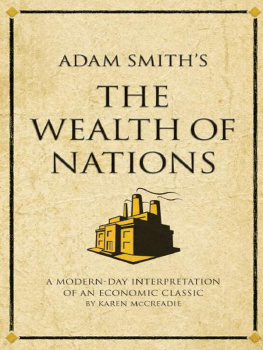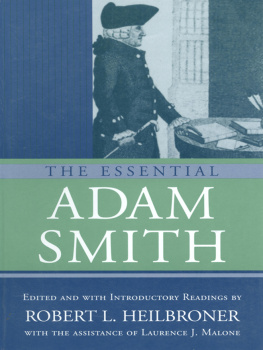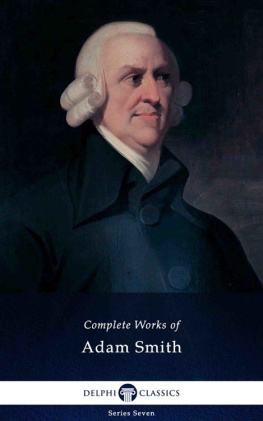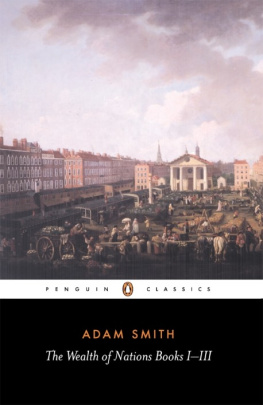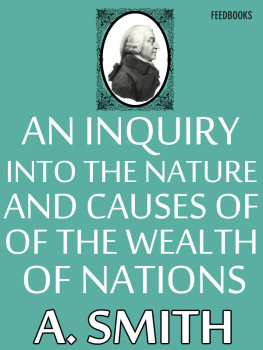Smith Adam - Adam Smiths Wealth of nations: a philosophical companion
Here you can read online Smith Adam - Adam Smiths Wealth of nations: a philosophical companion full text of the book (entire story) in english for free. Download pdf and epub, get meaning, cover and reviews about this ebook. City: Princeton;N.J, year: 2004;2008, publisher: Princeton University Press, genre: Romance novel. Description of the work, (preface) as well as reviews are available. Best literature library LitArk.com created for fans of good reading and offers a wide selection of genres:
Romance novel
Science fiction
Adventure
Detective
Science
History
Home and family
Prose
Art
Politics
Computer
Non-fiction
Religion
Business
Children
Humor
Choose a favorite category and find really read worthwhile books. Enjoy immersion in the world of imagination, feel the emotions of the characters or learn something new for yourself, make an fascinating discovery.
- Book:Adam Smiths Wealth of nations: a philosophical companion
- Author:
- Publisher:Princeton University Press
- Genre:
- Year:2004;2008
- City:Princeton;N.J
- Rating:4 / 5
- Favourites:Add to favourites
- Your mark:
- 80
- 1
- 2
- 3
- 4
- 5
Adam Smiths Wealth of nations: a philosophical companion: summary, description and annotation
We offer to read an annotation, description, summary or preface (depends on what the author of the book "Adam Smiths Wealth of nations: a philosophical companion" wrote himself). If you haven't found the necessary information about the book — write in the comments, we will try to find it.
Smith Adam: author's other books
Who wrote Adam Smiths Wealth of nations: a philosophical companion? Find out the surname, the name of the author of the book and a list of all author's works by series.
Adam Smiths Wealth of nations: a philosophical companion — read online for free the complete book (whole text) full work
Below is the text of the book, divided by pages. System saving the place of the last page read, allows you to conveniently read the book "Adam Smiths Wealth of nations: a philosophical companion" online for free, without having to search again every time where you left off. Put a bookmark, and you can go to the page where you finished reading at any time.
Font size:
Interval:
Bookmark:
On Adam Smiths Wealth of Nations
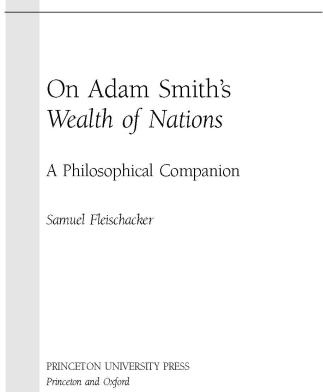
Copyright 2004 by Princeton University Press
Published by Princeton University Press, 41 William Street, Princeton, New Jersey 08540
In the United Kingdom: Princeton University Press, 3 Market Place,
Woodstock, Oxfordshire OX20 1SY
All Rights Reserved
Library of Congress Cataloging-in-Publication Data
Fleischacker, Samuel.
On Adam Smiths Wealth of nations : a philosophical companion / Samuel Fleischacker.
p. cm.
Includes bibliographical references and index.
ISBN 0-691-11502-8 (cl : alk. paper)
1. Smith, Adam, 1723-1790. 2. EconomicsPhilosophy. 3. Ethics. I. Title.
HB103.S6F59 2004
330.15'3dc21 2003042889
British Library Cataloging-in-Publication Data is available
This book has been composed in Berkeley Book
www.pupress.princeton.edu
Printed in the United States of America
1 3 5 7 9 10 8 6 4 2
10 9 8 7 6 5 4 3 2 1
In memory of my parents
CONTENTS
ACKNOWLEDGMENTS
This book was begun during a years leave underwritten by the University Center for Human Values at Princeton and the John M. Olin Foundation. More recently, a year at the Institute for the Humanities at the University of Illinois, Chicago provided me with the time and support to complete the book. I would also like to thank Kate Abramson, Thomas Brockelman, Lauren Brubaker, Lisa Downing, Charles Griswold, Ryan Hanley, David Hilbert, Rachana Kamtekar, Deirdre McCloskey, Jerry Muller, Amy Reichert, Ian Ross, Eric Schliesser, and Jeff Weintraub for helpful comments and criticism. Lori Watson provided both useful comments and extremely efficient research assistance. In addition to her editorial help, my wife, Amy Reichert, has borne the irritations attendant on writing a book with wonderful patience and understanding.
ABBREVIATIONS
When citing Smith, I will use page numbers, rather than the subdivisions provided in the standard Glasgow edition. I also include in the text references o all the works listed below by abbreviation and page number. If I cite a text several times in a row, in a single paragraph, I provide its abbreviation the first time and include only a page number for subsequent citations.
Works by Adam Smith
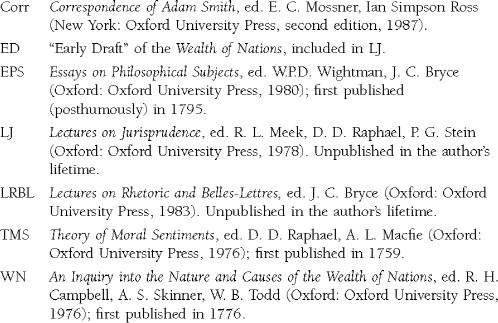
Other Works

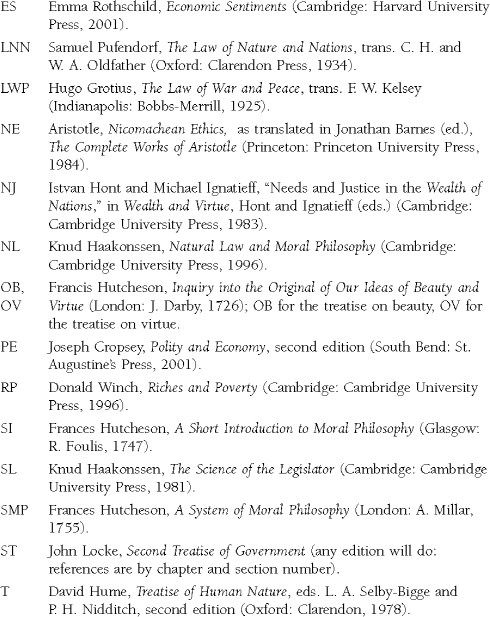
INTRODUCTION
Adam Smith was a philosopher before he was a social scientist, yet it remains unclear to this day what relationship his philosophical writings bear to his treatise on economics. There is little indication in the Inquiry into the Nature andCauses of the Wealth of Nations (WN) that the book was written by a person who had rich views on subjects ranging from scientific method to the foundation of moral judgment, and there is no explicit mention at all of Smiths earlier published work, the much-acclaimed Theory of Moral Sentiments (TMS). The apparent absence of moral concerns, in particular, from WN has puzzled many commentators. Perhaps we should view the writing of WN as a triumph of self-command, Smiths favorite virtue: Smith contributes to the founding of social science precisely by refraining from direct moral commentary most of the time in WN, by laying out the facts of political economy mostly in an impartial tone, free of his own attitudes toward those facts. But, if so, he seems to have achieved this impartial voice too well, leading people, wrongly, to suppose that he left his moral beliefs behind when he came to write WN. It is part of my purpose to help correct this supposition, to help bring us back to the virtues that lie within and just beyond the frame of WN. Social science today often requires that one refrain from talking about virtues, but Smith does not fully carry out this suspension of moral discourse, and where he does I think we can give moral reasons for the suspension. In any case, one thing that will concern us throughout this book is the tension between moral philosophy and social science.
There are several other running themes. Among them: that Smith is best regarded as a common sense philosopher, anticipating elements in the thought of his academic successor, Thomas Reid, and certain trends in twentieth-century philosophy; that Smith has an unusually strong belief in human equality, which has important implications for both his moral philosophy and his political economy; and that Smith played a role very different from the one usually assigned to him in the history of distributive justice. But my goal in this book is not to explicate or defend any overarching thesis about Smith; it is, rather, to provide a guide to the many philosophical questions that inform WN or are raised by its conclusions. (The book is indeed meant to be readable in separate sections, such that someone interested in Smiths views of justice, for instance, could read that section without the rest.) I hope that such a guide will be useful not just to experts, but to people coming to WN for the first time, or who have studied its political economy but never considered it from a philosophical angle.
Although Smith was a philosopher, no book of this sort has appeared before. Charles Griswold has given us a beautiful study of Smiths entire corpus from a philosophical perspective, and there is a careful and thorough examination of Smiths views on justice by Knud Haakonssen.
Economists tend to argue with Smith on matters of fact rather than of principle, whereas intellectual historians tend to be more interested in the sources of an idea, or its impact, than in its justification or its implications for future times. When I call the present study a philosophical companion, I mean both that I take up issues in WN that are likely to concern philosophers and that I have tried to address those issues in the way that philosophers do. That means that my interests are above all in the arguments Smith gives for his views, and that I sometimes reconstruct his arguments in modern terms, and argue with him when it seems to me that he holds a problematic view. I hope to stimulate questions about Smith as much as to answer such questions. Many of the difficulties in Smiths views and arguments arise from the fact that he was dealing with questions that remain difficult for us today. One model for my writing on Smith is his own account of other philosophers in Book VII of TMS. Smith respects his predecessors and reports their views faithfully, yet at the same time he translates those views into the terms of his own moral system and criticizes them where, by his lights, they fail. This is an excellent example of the philosophical history of philosophy. Philosophers tend to bring all ideas into the present tense, to look at each others work as if the author were alive right now and trying to persuade us of his or her ideas. They are rightly accused, sometimes, of being too uninterested in historical context when they do this, but on the other hand, it is hard to see why reasoning is worthwhile at all if ideas are merely determined by their contextif we cannot, by way of argument, rise on occasion above the prejudices and concerns of our time. That this is possible is an essential part of a philosophers faith, perhaps even part of the definition of philosophy, as that term has been understood since Socrates.
Next pageFont size:
Interval:
Bookmark:
Similar books «Adam Smiths Wealth of nations: a philosophical companion»
Look at similar books to Adam Smiths Wealth of nations: a philosophical companion. We have selected literature similar in name and meaning in the hope of providing readers with more options to find new, interesting, not yet read works.
Discussion, reviews of the book Adam Smiths Wealth of nations: a philosophical companion and just readers' own opinions. Leave your comments, write what you think about the work, its meaning or the main characters. Specify what exactly you liked and what you didn't like, and why you think so.





